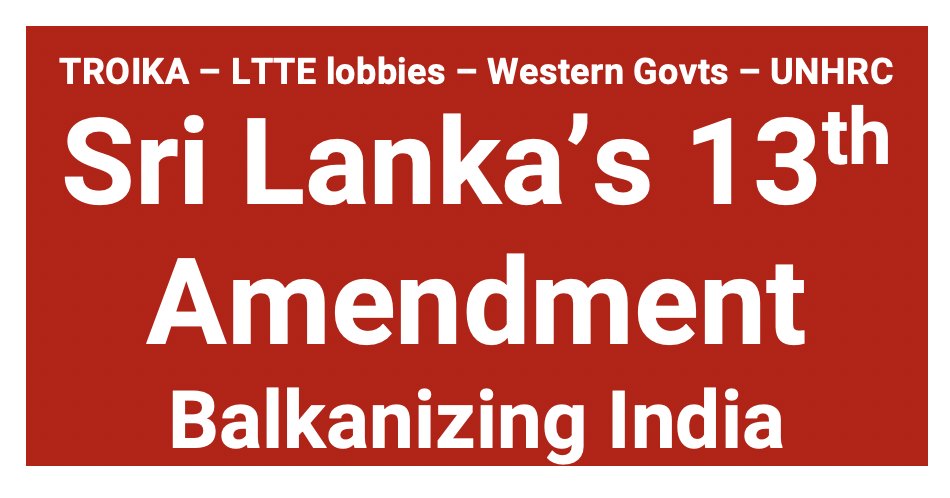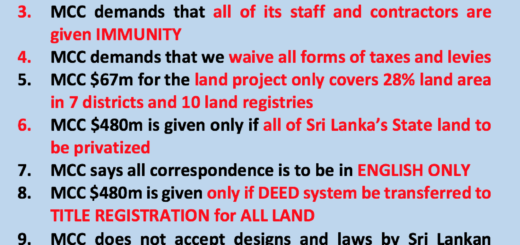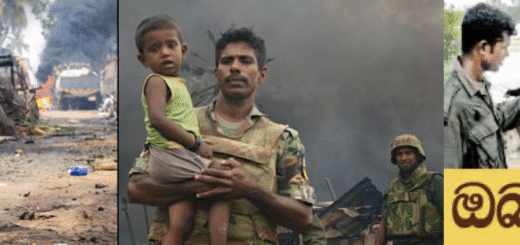Why India must Stop Sri Lanka from implementing 13th Amendment

The demand for full implementation of Sri Lanka’s 13th Amendment has once again surfaced — but it is important for India to pause and examine who is really making this demand, and why. This demand does not come from India or even Sri Lankan Tamils on the ground — it is being pushed by the UNHRC High Commissioner, echoing the same lines promoted by LTTE lobbies in the West. India must ask: why is the UNHRC aligning with LTTE narratives?
13th Amendment: A Failed Experiment
13th amendment was forced on Sri Lanka following the signing of the Indo-Lanka Accord in July 1987.
The geopolitical context has since changed drastically: the LTTE has been defeated, the merged North-East was legally demerged in 2005, and its first and only Chief Minister, Varatharaja Perumal, declared a unilateral declaration of independence in 1990 before fleeing to India. Nearly four decades on, the provincial council system has achieved nothing.
Provincial councils are a burden on taxpayers. People have not missed them when dissolved, as local government institutions continued functioning. Billions allocated to provinces have failed to uplift ordinary Tamils — funds often got stuck at the hands of elites, as seen in the North after the conflict when high-caste administrators blocked assistance to lower castes. Poverty indicators in the North and East remain unchanged, showing that the 13th amendment enriched politicians and bureaucrats, not ordinary citizens.
UNHRC’s Overreach and Western Engineering
(The Troika – UNHRC-LTTE lobbies-Western Govts)
The UNHRC has no mandate to dictate constitutional changes to sovereign nations. Yet, since 2009 it has passed resolution after resolution against Sri Lanka, attempting to impose external solutions. This is unprecedented — no other South Asian country has been subjected to such engineered “minority rights” interventions.
Each resolution has been driven by Western states working hand-in-hand with LTTE-linked diaspora networks. The so-called “demand” for the 13th Amendment’s implementation is being inserted into UNHRC texts to internationalize an issue that is purely domestic.
India must recognize the danger: if the UNHRC succeeds in using Sri Lanka as a laboratory for externally dictated federalism, it sets a precedent that tomorrow can be applied against India on Kashmir, the Northeast, or caste-based issues.
As a leading Asian power and member of the Global South, India cannot allow the UNHRC to set such a precedent. New Delhi must use its diplomatic weight to lobby against intrusive UNHRC resolutions.
Sri Lanka’s sovereignty is essential for India’s own long-term national security.
Manufactured Demands, not grassroots Tamil Aspirations
Ordinary Tamils in Sri Lanka seek jobs, education, and stability. Many are unaware of what the 13th Amendment even is.
The “demand” for 13th amendment is manufactured abroad, amplified by a handful of Tamil politicians funded by Western NGOs and hired media (local & foreign), and promoted by LTTE-linked diaspora groups. These lobbies, once the propaganda machinery of the LTTE, now serve as poodles for Western interests to pressure Colombo.
India must also recognize that Tamil Nadu considered a soft target and is being used as another pawn in this game of Western manipulation. Western-funded narratives promoting separatism, federalism, and even bizarre claims like merging Sri Lanka with Tamil Nadu are amplified by opportunistic politicians and film stars.
These demands are not organic but externally seeded.
Recent noise about reclaiming Katchchativu or merging Sri Lanka with Tamil Nadu is part of the same sponsored script. If India indulges such narratives even believing it could calculate the scenario for India’s advantage, India risks importing separatist instability into its own borders. These are experiments India should not toy with.
The Real Danger: Balkanization of India
What is being tested in Sri Lanka today — using constitutional amendments and “minority rights” as tools to weaken the state — can be turned against India tomorrow:
- Kashmir:Article 370 echoes.
- Northeast:Ethnic grievances internationalized.
- Caste:Framed as a human rights crisis for foreign leverage.
Western agendas disguised as Minority Rights
Western states have mastered the art of weaponizing ‘minority rights’ to weaken governments in the Global South. If Sri Lanka can be pushed into externally dictated federalism, India should expect the same playbook in Kashmir, the Northeast, and even through caste-based faultlines.
Balkanization of India is not hypothetical — it is the unspoken next agenda after separating Sri Lanka.
If India has doubts, revisiting the UNHRC resolutions and High Commissioners demands from Sri Lanka should awaken India.
Western Interests, Not Tamil Interests
The West has no permanent friends, only interests.
The West has never hesitated to betray India when it suited their interests.
Even as a QUAD partner, the US has slapped tariffs and visa restrictions on India.
In 2015, India however partnered with the West in Sri Lanka’s regime change, where has that partnership got India?
Why should India now help West to undermine Sri Lanka’s sovereignty – only to find the same strategy applied against India tomorrow?
Should India indulge Western-backed Tamil lobbies that seek to break Sri Lanka’s unitary state with 13th amendment as its first step?
Stability Lies in Sovereignty
Regional peace and stability cannot be built on externally dictated constitutional amendments. If Sri Lanka’s sovereignty is eroded today, the precedent will haunt every South Asian state tomorrow. Supporting Sri Lanka’s independent reconciliation process strengthens South Asia’s collective security and prevents Western manipulation of internal affairs.
India’s strategic interest lies in respecting & protecting Sri Lanka’s sovereignty, not in enforcing a rigid, decades-old failed 13th Amendment. and resisting Western attempts to use Tamil lobbies as proxies.
Sri Lanka is the frontline test: defend its sovereignty today, or risk the same playbook being turned against India tomorrow.
Message to Pro-India Lobbies
- Do not mistake LTTE diaspora propaganda for Tamil aspirations.
- Recognize thatTamil Nadu is also being used as a pawn in Western strategic games.
- Understand that Sri Lanka’s fight against externally imposed federalism is linked directly to India’s own fight to preserve sovereignty and unity.
If India pushes the 13th Amendment in the light of its fragile control of Tamil Nadu, it will not just be Sri Lanka’s sovereignty that bleeds — it will open the door for India’s own fragmentation.
Sri Lanka is the frontline warning: protect its sovereignty today, to protect India’s tomorrow.
Shenali D Waduge







